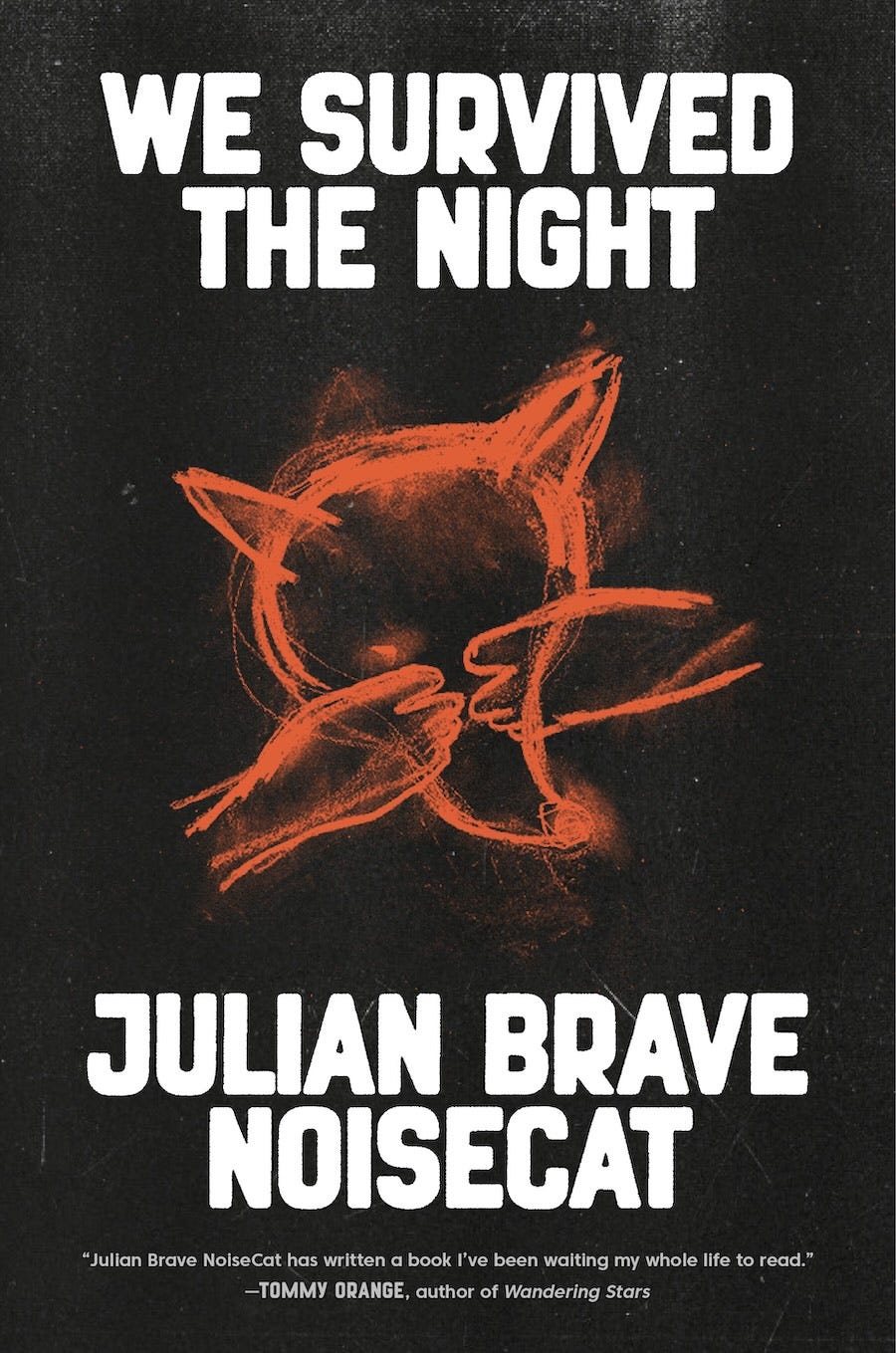Fathers and Sons
In "We Survived the Night" Julian Brave NoiseCat looks back to coyote stories to understand and rebuild his relationship with his own father
Julian Brave NoiseCat’s We Survived the Night, the Ink Book Club’s November pick, offers a crash course on what this continent’s First Peoples have had to grapple with — invasion, colonization, brutal violence, theft of land, forced displacement, and much more. In his remarkable first book — a companion piece to NoiseCat’s award-winning documentary, Sugarcane — he reflects on that history, and how coordinated attempts by North America’s governments and others to eradicate indigenous language, culture, and mythology, while devastating, have failed. Native Americans are very much still here. In fact, NoiseCat is part of a contemporary resurgence of Indigenous cultural, environmental, and political traditions.
But like the film, the book is very personal, centering on his quest to understand who he is in the context of his people’s history, and through that knowledge, to make peace with his estranged father, Ed Archie NoiseCat. The elder NoiseCat grew up on the Canim Lake Indian Reserve in British Columbia, where he “never saw a future for himself… only a painful past of mere survival.” He did go on to build a future as a prominent artist, but that he survived at all was a kind of miracle, given his origin story:
Dad was born unwanted. He was left in an incinerator the way unwanted Indian babies were at St. Joseph’s Mission. Except, to the best of our knowledge, the culprit wasn’t the missionaries. It was his own mother.
That his father only later learned the details of his brutal abandonment didn’t prevent him from feeling unloved, resentful, and ultimately incapable of properly parenting his own son, whom he deserted after divorcing Julian’s mother, who is white. She raised him in Oakland, California, but returned to Canim Lake regularly and made sure he grew up connected to his culture, his language, and his relatives, as part of the Indian world.
The book is built around the larger canvas of the Native American experience, and alternates between NoiseCat’s memoir and coyote stories — tales drawn from the ancient oral narratives of Coyote, the mythic trickster and shapeshifter it was believed had been sent by the Creator to curate the world.
The stories NoiseCat retells portray a being with immense powers of transformation and trickery that enable the survival of his people (the Canim Lake Band Tsq’escen consider themselves “Coyote People,” descendants of the trickster) and are also responsible for the very existence of death. “Coyote and his Son,” one of the tales NoiseCat tells here, is “about dads who love and then leave on account of their own shit.” And it’s through this story that NoiseCat comes to understand the intergenerational trauma that’s behind his own father’s abandonment of his responsibilities to his son — and to begin the process of reconciliation.
“All these generations later, we’ve still got stuff we’re working through. Because our fathers are Coyote,” NoiseCat writes.
We hope you’ll join us when we meet with Julian Brave NoiseCat on Wednesday, November 19, at 12:30 p.m. Eastern, and then again on Wednesday, December 3, also at 12:30 p.m. Eastern. In the meantime, please pick up a copy of We Survived The Night and read along with us. And below, for our Book Club members, you’ll find some questions to consider as you read.
The Ink Book Club is open to all paid subscribers to The Ink. If you haven’t yet become part of our community, join today. And if you’re already a member, consider giving a gift or group subscription.





